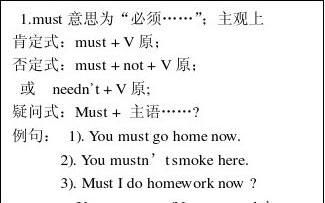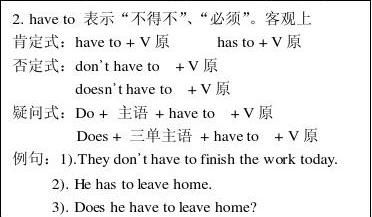新人教版七年级下册英语期中重点知识总结
Unit 1 Can you play the guitar?
1、在某方面帮助某人 你能帮孩子们(kids)游泳吗?
help sb. with sth Can you help kids with swimming?
2、帮助某人做某事 我姐姐帮助我学英语。
help sb. (to) do sth My sister helps me (to) learn English.
(My sister helps me with my English.)
3、善于应付...的;和……相处的好 这个老师和孩子们(kids)相得很好。
The teacher is good with the kids.
be good with 你和老人(old people)相处的好吗?
Are you good with old people?
4、擅长 be good at 我擅长英语。I am good at English.
他擅长游泳。He is good at swimming.
5、和某人谈论(某事)(两个短语) 他和我谈论足球。He talks with me about soccer. talk to sb /talk with sb (about sth.)
6、告诉某人某事 tell sb. sth. 我告诉他真相(the truth)。I tell him the truth.
7、讲故事 tell stories 8、play the violin/guitar/drums/piano 弹奏…(乐器)
9、一点 a little 我会讲一点英语。I can speak a little English.
10、want的用法:
想做某事 want to do sth 我想踢足球。I want to play football.
想要某物 want sth 我想要一台钢琴。 I want a piano.
11、like的用法: 我喜欢打篮球。I like to play basketball./I like playing
basketball.
like to do sth./like doing sth 我喜欢与人们交谈和做游戏。
I like to talk and play games with people.
12、too 与also的区别:also 常放在句中,
too 一般用于句末,其前常加逗号
我会说英语,我也会踢足球。I can speak English and I can also play soccer.
我会弹吉它,我也会弹钢琴。I can play the guitar. I can play the piano, too.
13、or 用于选择疑问句, 你会唱歌或跳舞吗?Can you sing or dance?
或否定句表并列 我不喜欢苹果和香蕉。 I don’t like apples or
bananas.
14、交朋make friends 15、在周末 on the weekend/on weekends
16. can you swim? Yes,I can./no, I can’t..
Can he/she/Jane/they play chess?
What can you do? I can dance. 你会/能做什么?
What club do you want to join? 你想参加什么俱乐部?
I want to join a sports/music/ the art club.
Unit 2 What time do you go to school?
短语/词组:
get up 起床 get home到达家中 go to work去工作 make breakfast做早饭 practice guitar 练吉它 take a shower洗淋浴 go to class 上课 take the Number 17 bus to the Hotel 乘17路公共汽车去旅馆
go to school 上学 have breakfast/dinner/lunch 吃早、晚、午饭 go to bed 睡觉 put on 穿衣服(反义词take off) listen to 听… do one’s homework 做家庭作业 tell sb. about sth. 告诉某人某事 in the morning/afternoon/evening 在早上/下午/晚上
英语时间的表达:
(1)整点时间可表示为“钟点数+o’clock”或直接读钟点数,省去o’clock。如: It’s ten o’clock a. m. 现在是上午十点整。
(2)非整点时间可采取读数法。
6:10 →six-ten 8:50→eight-fifty 9:30→nine-thirty 10:15→ten-fifteen 7:45→seven forty-five 11:05→eleven-five
(3)分钟数不超过30分钟,可用介词“past”。如:11:05→five past eleven 8:15→a quarter past eight/fifteen past eight 9:30→half past nine或thirty past nine
(4)分钟数超过30分钟,用介词to,表示“差,不到”。如:
11:50→ten to twelve 9:45→a quarter to ten或fifteen to ten
12:59→one to thirteen
句型 1.What time do you usually get up? 你通常什么时候起床?
I usually get up at six o’clock. 我通常六点起床。 What time does your sister usually get up? 你妹妹通常什么时候起床?
She usually gets up at 6:30. 她通常6:30起床。
2. when does scott go to work ? He laways goes to work at 11:00.
When do your friends exercise? They usually exercise on weekends.
3.What is the time? 几点了? It’s twelve o’clock. 12点了。
4. School starts at nine o’clock. 九点钟学校开始上课。
Unit3 How do you get to school?
一、短语,词组
1.get to school 到校 2.take the subway/train/bus 乘地铁/坐火车/乘公共汽车
3. worry about 担忧,焦虑,担心4.leave for 到……地方去,离开去某地
5.take…to…把……带到…… 6. most students 大多数学生
7. depend on 依赖,决定于8.from…to…从……到……
9.think of 想到,想起 10.ride bikes 骑自行车
11.in other parts of the world 在世界的其他地方 12. how far 多远
13. be different from和……不同
14.go to school by boat/on foot 乘船/步行去上学
15.drive a car 开车 16.come true 实现 17.cross the river 过河
二、句型
1.How do you get to school? 你怎么去学校?
I ride my bike./ I go to school by bike.我骑自行车去学校。
How does she go to work? 她怎么上班?
She takes the bus./she goes to work by bus.她乘公交去上班。
2.how far is it from your home to school?你家离学校有多远?
It’s about 3 kilometers.大约3公里。
3. how long does it take to get to school? 去学校大概花费多长时间? It takes about 20 minutes. 大概20分钟。
4. It takes sb some money/time to do sth.花费某人多少时间/钱做某事.
It takes me 20 nimutes to do my homework. 做作业大概花费我20分钟时间。
5. Does jane walk to school?简步行去学校吗 No,she doesn’t.不,她不是。
6.their dream can come ture.他们的梦想能够实现。
7.感谢用语:Thank you very much , Thanks a lot
回答感谢用语的句子:That’s ok /all right. 不用谢。You are welcome 不客气。 It is my pleasure./My pleasure./It is a pleasure.不客气、那是我的荣幸。
Don’t mention it.别在意。 It was nothing at all.那没什么。
Unit 4 Don't eat in class.
短语:1. in class 在课上 in the classroom 在教室里
2. arrive late for class = be late for class上课迟到 3. (be) on time 准时
4. fight with sb. 和某人打架 5. must = have to 必须做 不得不做
6. bring…to… 把…带到…来 Bring your books to school .
7. eat outside 在外面吃饭 wear a uniform 穿制服wear glasses 戴眼镜
8. practice the guitar 练习吉它 practice playing the guitar 练习弹吉他
9. on school nights在上学的晚上 on school days在上学的日子
10. too many + 可数名词复数 too much + 不可数名词 表示太多…
11. make one’s bed 铺床 make breakfast 做早饭 make friends 交朋友


13.too 肯定句中表示“也”。either 否定句中表示“也”

I can play chess. She can, too.
I can’t play chess. She can’t, either.
14.think about = think of 考虑、认为
How do you think about this sweater? 你觉得这件毛衣怎样?
15. make rules 制定规则follow the rules 遵守规则break the rules 违反规则
16. keep (+名词或代词)+形容词,表示保持某物怎么样 keep quiet 保持安静
keep your hair short保持头发短 keep your room clean 保持房间干净
17. be strict (with sb.) 对某人严格 My mom is strict with me.
18.school rules 校规
句型:祈使句:动词原形开头。
Open the door! Don’t run in the hallways.
What are the rules?规则是什么? We must wear the school uniforms.我们必须得穿校服。 What do you have to do? We have to be quiet in the library.
Unit 5 Why do you like pandas?
短语:
1.like sth. 喜欢某物 I like pandas. like to do sth.= like doing sth. 喜欢做某事 I like to watch TV.= I like watching TV.
like 另有介词“像…一样”的意思,如:He jumps here and there, like a monkey.
2. welcome to + 地名 表示欢迎来到某地 如Welcome to Beijing./Welcome to my home.
3. want sth. 想要某物 如:I want a new school bag.
want to do sth. 想做某事 如:She wants to be a singer.
I’d love to = I’d like to 表示我想去… I’d = I would
would like to do = want to do 如:I would like to go to a movie.
4. kind of+形容词=a little +形容词 表示 有点 kind 另有种类的意思
5. be from = come from 表示来自哪里
He is from China.= He comes from China.
Is he from China= Does he come from China?
Where is he from?=Where does he come from?
6. walk on 表示用某种方式行走 walk on two legs walk on hands 倒立行走
7. one of my friends 我的朋友之一
8. be in (great ) danger 处于(极大的)危险中. 如:Tigers are in great danger. dangerous adj.危险的 如:Tigers are dangerous.
9. get lost 迷路 lost 是形容词,表示丢失了的
10. (be) made of… 由什么制成 如:Paper is made of timber(木材).
11. live in + 地名 表示住在某地 如:I am from England, but I live in China. 句子:
1.---Why do you like pandas? ---Because they’re kind of interesting.
---Why does John like koalas? -- Because they’re very cute
—Why don’t you like tigers?--Because they’re really scary.
2. --Where are lions from?
--They’re from South Africa.
Unit 6 I'm watching TV
词组,短语
1. wait for sb /sth 等侯某人/某物
2. do one's homework (此处的do是"做"的意思)
3. talk on the phone
4. watch look see read 的大致区别:
watch 观看,看 watch TV 看电视 watch a football game 看一场足球比赛 see 看见(看的结果) I can see the bird in the tree.
look 看(看的动作) Please look at the blackboard.
read 阅读,读书,读报 She is reading a story.
5. go to the movies 去看电影
6. That sounds good. 那听起来不错
7. TV show 电视节目
8. at six o'clock 在六点钟
9. use the computer 使用电脑
10 make soup做汤 11.wash/do the dishes 洗盘子
重点句子
现在进行时态的构成: 主语+ be+ v-ing
表示此时此刻正在发生或正在进行的动作
1. What are you doing? I'm watching TV.
What's he doing? He's reading.
What are they doing? They’re listening to a CD.
2. Are you doing your homework? Yes,I am./no, I’m not.
Is she reading a newspaper? Yes,she is.
Is Nancy doing homework? No, she isn't.
3.They are not talking about the TV show.他们不是在谈论那个电视节目。
4. What's he waiting for?
-
人教版七年级下册英语知识点复习(完整版)
新目标英语七年级下册知识点总结Unit1Canyouplaytheguitar1情态动词V原candobeabletodo2Pla…
-
20xx新版人教版七年级英语下册各单元知识点汇总
20xx人教版七年级下册英语各单元知识点大归纳Unit1Canyouplaytheguitar短语归纳1playchess下国际象…
-
20xx年人教版七年级英语下册知识点总结及练习
20xx年人教版七年级英语下册知识点总结及练习Unit1Canyouplaytheguitar情态动词概念情态动词表示说话人对所说…
-
人教版七年级英语下册重点知识全面归纳
20xx年人教版七年级下册英语单元模块复习资料Unit1Canyouplaytheguitar一词汇拓展1sing现在分词sing…
-
20xx年人教版七年级英语下册知识点总结及练习
七年级下Unit1Canyouplaytheguitar短语归纳playchess下国际象棋playtheguitar弹吉他spe…
-
人教版八年级下册英语知识点总结
八年级英语第一单元知识点归纳(20xx年x月)1.bescaredofsb./sth.恐惧某人/某物2.goup上升,与rise同…
-
人教版八年级英语下册1-2单元知识点总结
Unit1What’sthematter?1.What’sthematter?=What’sthetrouble?=What’sw…
-
七年级下册英语 Unit7 It's raining单元知识点总结
最新人教版第七单元It’sraining单元知识点总结一、询问天气的句型及其答语.1.例句:--How’stheweather?天…
-
人教版八年级英语下册各知识点归纳总结
人教版八年级英语下册各知识点归纳总结Unti1whatsthematter短语归纳1toomuch太多2liedown躺下3get…
-
20xx年秋新人教版八年级英语下册各知识点归纳总结
壹学英语No1English20xx年秋新人教版八年级英语下册各知识点归纳总结Unti1whatsthematter短语归纳1to…
-
20xx人教版七年级下册英语各单元知识点归纳
Unit1Canyouplaytheguitar?◆短语归纳1.playchess下国际象棋2.playtheguitar弹吉他3…